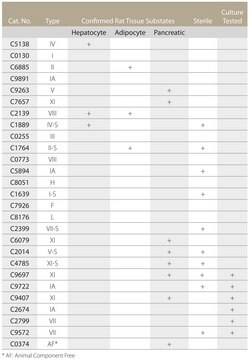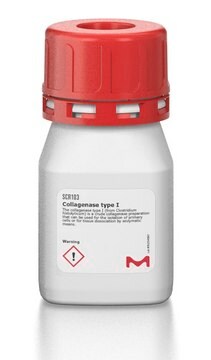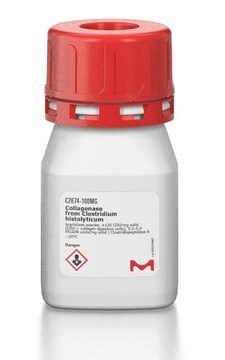C6079
Collagenase + protease inhibitor
2-5 FALGPA units/mg solid, ≥800 CDU/mg solid
Sinónimos:
Collagenase preparation, Protease inhibitor solution
About This Item
Productos recomendados
biological source
bacterial (Clostridium histolyticum)
Quality Level
form
solid
specific activity
≥800 CDU/mg solid
2-5 FALGPA units/mg solid
mol wt
68-130 kDa
shipped in
dry ice
storage temp.
−20°C
Gene Information
rat ... LOC296948(296948)
Categorías relacionadas
Application
Biochem/physiol Actions
Other Notes
Quality
Inhibitor
signalword
Danger
Hazard Classifications
Acute Tox. 4 Dermal - Acute Tox. 4 Inhalation - Acute Tox. 4 Oral - Resp. Sens. 1 - Skin Sens. 1
Storage Class
11 - Combustible Solids
wgk_germany
WGK 3
flash_point_f
Not applicable
flash_point_c
Not applicable
ppe
dust mask type N95 (US), Eyeshields, Faceshields, Gloves
Elija entre una de las versiones más recientes:
¿Ya tiene este producto?
Encuentre la documentación para los productos que ha comprado recientemente en la Biblioteca de documentos.
Los clientes también vieron
Nuestro equipo de científicos tiene experiencia en todas las áreas de investigación: Ciencias de la vida, Ciencia de los materiales, Síntesis química, Cromatografía, Analítica y muchas otras.
Póngase en contacto con el Servicio técnico

![N-[3-(2-Furyl)acryloyl]-Leu-Gly-Pro-Ala](/deepweb/assets/sigmaaldrich/product/structures/805/876/96b5fb57-71c8-4c6b-b5d2-fafe7374cd85/640/96b5fb57-71c8-4c6b-b5d2-fafe7374cd85.png)







